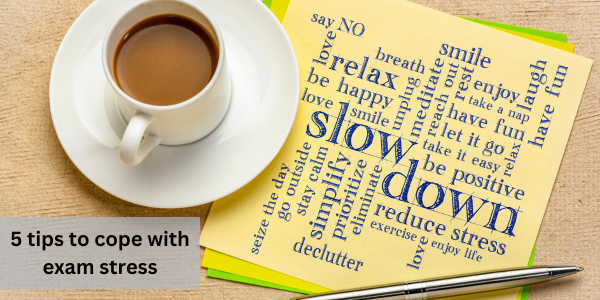 Exams can be a significant source of stress for students of all ages, from primary school to college and beyond. The pressure to perform well, the fear of failure, and the overwhelming amount of information to study can create anxiety and stress that can negatively impact academic performance. However, with the right strategies and mindset, it is possible to reduce exam stress and perform at your best. In this blog, we will explore practical tips and techniques on how to effectively manage exam stress, so you can approach your exams with confidence and achieve success. Whether you’re a student preparing for your first exam or a seasoned test-taker looking to improve your exam performance, these tips can help you reduce exam stress and excel in your studies.
Exams can be a significant source of stress for students of all ages, from primary school to college and beyond. The pressure to perform well, the fear of failure, and the overwhelming amount of information to study can create anxiety and stress that can negatively impact academic performance. However, with the right strategies and mindset, it is possible to reduce exam stress and perform at your best. In this blog, we will explore practical tips and techniques on how to effectively manage exam stress, so you can approach your exams with confidence and achieve success. Whether you’re a student preparing for your first exam or a seasoned test-taker looking to improve your exam performance, these tips can help you reduce exam stress and excel in your studies.
Also Read: How to List Areas of Interest in Your Resume?
5 Tips on How to Handle Exam Stress
Here are some handy tips that can help to dissipate stress and make sure you can get through exam season.
- Plan and Organize: One of the most effective ways to reduce exam stress is to create a study plan and organize your study materials. Start by making a schedule that outlines what topics or subjects you need to study and allocate specific time slots for each one. This will help you stay focused and manage your time effectively, reducing the last-minute cramming that can increase stress levels. Additionally, gather all the necessary study materials, such as textbooks, notes, and practice exams, in one place to avoid wasting time searching for them during your study sessions.
- Practice Self-Care: Taking care of your physical and mental well-being is crucial during exam season. Make sure to get enough sleep, eat nutritious meals, and engage in regular physical activity to keep your body and mind in optimal condition. Avoid excessive caffeine or sugary snacks, as they can disrupt your sleep and increase anxiety levels. Taking breaks during your study sessions and engaging in activities you enjoy, such as reading, listening to music, or spending time with friends, can also help you relax and recharge.
- Practice Relaxation Techniques: Exam stress can take a toll on your mental and emotional well-being. Incorporating relaxation techniques into your routine can help you calm your mind and manage stress. Techniques such as deep breathing, meditation, and progressive muscle relaxation can help reduce anxiety and increase focus. Experiment with different relaxation techniques to find what works best for you and practice them regularly to build resilience to exam stress.
- Break Down Your Study Material: Studying for exams can feel overwhelming, especially when you have a large volume of material to cover. Breaking down your study material into smaller, manageable chunks can make it easier to approach and reduce stress. Create a study plan that breaks down the material into smaller sections and focus on mastering one section at a time. Celebrate your progress after completing each section and avoid trying to memorize everything at once. Remember to practice active learning techniques, such as summarizing concepts in your own words or teaching the material to a friend, to reinforce your understanding.
- Seek Support: It’s essential to remember that you don’t have to go through exam stress alone. Reach out for support when you need it. Talk to friends, family, or teachers about your concerns and seek their guidance or advice. Forming a study group with classmates can also help you collaborate, clarify doubts, and share the workload. Additionally, many schools and universities offer counseling services or academic support programs, so don’t hesitate to utilize these resources if needed.
We know that exams can be stressful, and implementing effective strategies can help you manage and reduce exam stress. By planning and organizing your study sessions, practicing self-care, using relaxation techniques, breaking down your study material, and seeking support when needed, you can approach exams with a calm and confident mindset. Remember to take care of your well-being and prioritize self-care during this challenging time. Good luck with your exams!
10 Quick Ways to Eliminate Exam Stress
- Create a study schedule and stick to it.
- Take regular breaks to avoid burnout.
- Practice deep breathing or other relaxation techniques.
- Get enough sleep to keep your mind and body refreshed.
- Stay physically active to reduce stress and increase focus.
- Use positive affirmations and self-talk to boost confidence.
- Break down study material into smaller, manageable chunks.
- Avoid last-minute cramming and prioritize consistent studying.
- Seek support from friends, family, or teachers when needed.
- Practice good self-care, including healthy eating and staying hydrated.
Exam stress is a common experience for students, but it can be managed and reduced with effective strategies. By creating a study schedule, taking regular breaks, practicing relaxation techniques, prioritizing self-care, and seeking support when needed, you can alleviate exam stress and approach exams with a clearer mind and increased confidence. Remember to take care of your physical and mental well-being during exam season, and don’t hesitate to reach out for help when needed. With proper planning and self-care, you can navigate through exams with a calmer mindset and perform at your best. Good luck with your exams!

























